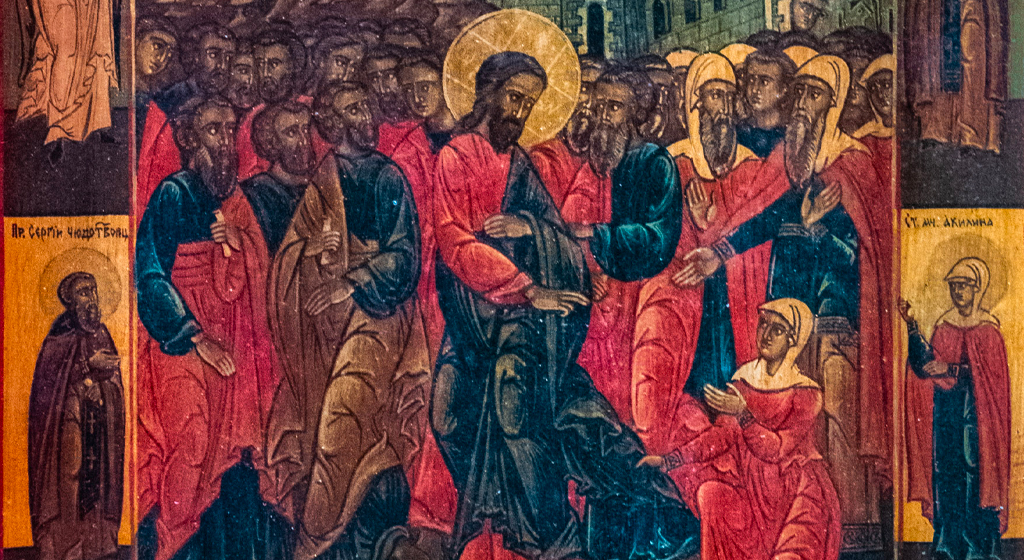Memory of the Poor
Reading of the Word of God
Alleluia, alleluia, alleluia
This is the Gospel of the poor,
liberation for the imprisoned,
sight for the blind,
freedom for the oppressed.
Alleluia, alleluia, alleluia
Genesis 1,1-19
In the beginning God created heaven and earth. Now the earth was a formless void, there was darkness over the deep, with a divine wind sweeping over the waters. God said, 'Let there be light,' and there was light. God saw that light was good, and God divided light from darkness. God called light 'day', and darkness he called 'night'. Evening came and morning came: the first day. God said, 'Let there be a vault through the middle of the waters to divide the waters in two.' And so it was. God made the vault, and it divided the waters under the vault from the waters above the vault. God called the vault 'heaven'. Evening came and morning came: the second day. God said, 'Let the waters under heaven come together into a single mass, and let dry land appear.' And so it was. God called the dry land 'earth' and the mass of waters 'seas', and God saw that it was good. God said, 'Let the earth produce vegetation: seed-bearing plants, and fruit trees on earth, bearing fruit with their seed inside, each corresponding to its own species.' And so it was. The earth produced vegetation: the various kinds of seed-bearing plants and the fruit trees with seed inside, each corresponding to its own species. God saw that it was good. Evening came and morning came: the third day. God said, 'Let there be lights in the vault of heaven to divide day from night, and let them indicate festivals, days and years. Let them be lights in the vault of heaven to shine on the earth.' And so it was. God made the two great lights: the greater light to govern the day, the smaller light to govern the night, and the stars. God set them in the vault of heaven to shine on the earth, to govern the day and the night and to divide light from darkness. God saw that it was good. Evening came and morning came: the fourth day.
Alleluia, alleluia, alleluia
The Son of Man came to serve,
whoever wants to be great
should become servant of all.
Alleluia, alleluia, alleluia
Today we start reading the book of Genesis, the first book of the Bible, in which the first eleven chapters report Israel's thinking about creation and humanity. Genesis was not the first book to be written; it came about after the period of exile in Babylon. After the terrible experience of exile, it was a moment of deep reflection for the people of Israel as they tried to deeply understand their past and find an explanation for their existence as a people. While they pondered, they found answers to issues around the meaning of creation, of life, of the existence of evil in human life, death and still more questions. A text about the reasons of our world and life emerged. Why do we live? Where did we come from? Where are we going? Answers to these questions start in the very first words of Genesis "In the beginning". The deeper meaning of things has more to do with content than with temporal accuracy. Why do we exist? Because God wanted it. And God stands at "the beginning" of creation, at the origin of the world, in the depths of every human being. At its base, science speaks of the origins of the universe, yet it cannot respond to the questions of meaning or of why we exist. God wanted us; and he is the Lord, the only Lord of our lives. No one else can present himself or herself as being "at the beginning," at the founding of human life or of creation itself. This particular passage talks about the fourth day when the sun, moon and stars were created in order to bring "light" in the heavenly firmament; so that they may "be for signs and for seasons and for days and years." The passage marks the mid-point in the seven days of creation. Indeed, even though light was created on the first day, only on the fourth was its existence given a purpose for creation. Even if at first, light and darkness serve to distinguish day from night, the author underlines the fact that they were created to regulate time for men and women so that they adapt to God's rhythm, that is liturgical feast days. Indeed, without feasts - as we will see more clearly in the Sabbath, the "seventh day" - creation does not reach its full completion. In a society like ours that is losing the sense of a feast day, the creation story reminds us not to put our work and activity at the centre of everything. Welcoming time for God in our day is critical for us and for our society in order to avoid violence and any kind of oppression. God's time saves humanity's time. In the historical dialogue between God and human beings, humanity finds its salvation.
